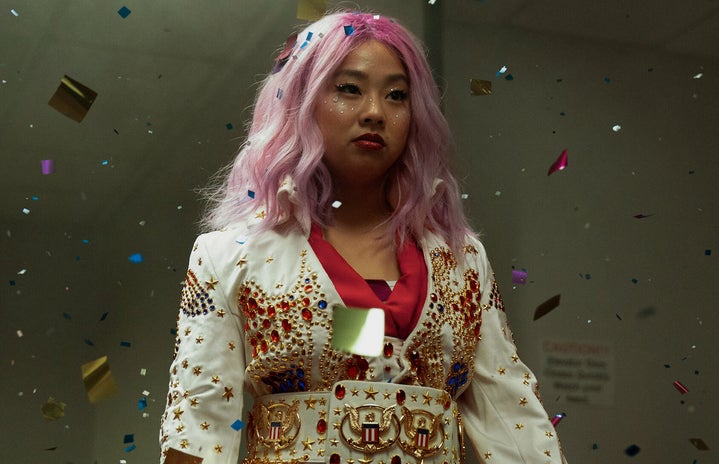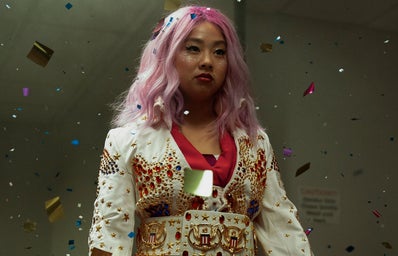The film’s title is a mouthful, but it is ironically the most straightforward thing about A24’s Everything Everywhere All at Once (EEAAO).
When you learn that the starring actors in Everything Everywhere All at Once are Michelle Yeoh and Ke Huy Quan playing Evelyn and Waymond Wang, you might expect there to be martial arts – particularly if you see the movie poster first. When you learn they have a stubborn, defiant daughter, Joy (Stephanie Hsu), you might expect there to be an investigation into intergenerational trauma. But there’s more: hot dogs for fingers, rocks, raccoons, everything bagels, intentional paper cuts, buttplug-inspired trophies, ‘google[y]’ eyes, and an underlying, touching story of what life is like when you’re growing up in America, Asian and queer.
The film follows Evelyn Wang, a Chinese-American immigrant who wants to host a Chinese New Year Party and save her family’s laundromat service while being audited by the IRS (specifically, Jamie Lee Curtis’ Deirdre). When an alternate version of her husband, Waymond Wang, informs her that the multiverse is in danger, Evelyn must “verse jump” – hop between the parallel universes to access skills from her other selves – to save the entirety of all universes under precarious and dire situations.
So, what is the threat to all the verses? It is a creation of her own: Evelyn and Waymond’s daughter, Joy. In another universe, Evelyn was a brilliant scientist who had devised a way to track her parallel forms and jump to them. Eventually, she forces her daughter to undergo extreme forms of mental conditioning to become the greatest jumper of them all. The incessant drilling pushes Joy to the edge and she adopts an all-too-relatable nihilistic perspective on life.
Against all belief that the world and our decisions do not matter, Joy and Evelyn both confront the truth that there is something that holds them together.
Joy becomes “Jobu Tupaki,” who has created a black hole that threatens the existence of all dimensions. In spite of this, Joy seeks out her mother. At first glance, it seems that the intent is murderous. But even Joy cannot explain her own behavior until her mother confesses: “No matter what, I still want to be here with you.” Against all belief that the world and our decisions do not matter, Joy and Evelyn both confront the truth that there is something that holds them together. Something that every multiverse shares.
The first conflict in the film, however, is one far more relatable than trying to save every version of reality. Instead, it brings to light the strained mother-daughter relationship as a result of Evelyn’s insistence that Joy keeps her queerness to herself. More specifically, Evelyn thinks it would be disastrous for her father — Joy’s grandfather — to know about Joy’s girlfriend, Becky (played by Tallie Medel).
Daniel Kwan and Daniel Scheinert, the directors of the film, wrote on Twitter that EEAAO “was a dream about reconciling all of the contradictions, making sense of the largest questions, and imbuing meaning onto the dumbest, most profane parts of humanity. We wanted to stretch ourselves in every direction to bridge the generational gap that often crumbles into generational trauma.”
It’s rare for a film to tell a realistic story about Asian, queer daughters’ relationships with their mothers, and even more rare for such a story to be portrayed by those who have had these lived experiences.
Joy is clearly hurt by her mother’s shame regarding her sexuality. Although her mother claims to be more progressive than other parents in the sense that she hasn’t disowned Joy, her tolerance only goes so far; she sees Joy’s relationship with her girlfriend as a burden, one that shouldn’t be put on others. Having to hide a part of who she is from her grandfather and facing disapproval from her mother ultimately affects her mental health. She’s more than just gay. She is depressed, gets tattoos, and acts impulsively. All of these characteristics, Evelyn labels as manifestations of selfishness.
It helps that the actors Hsu and Medel are “out” too, ensuring there is authenticity in the telling of a defiantly queer story. It’s rare for a film to tell a realistic story about Asian, queer daughters’ relationships with their mothers, and even more rare for such a story to be portrayed by those who have had these lived experiences.
Hsu spoke to Out about the significance of this representation and her role, saying that the film was one of the first to transcend identity politics while being so explicitly and significantly both Chinese and gay. “When I read the script, a queer love story felt so obvious, an Asian family is so obvious, because that’s also my life. I feel so relieved that it’s a part of the texture of the film, but yet not like, ‘Look at my hat.’ You know? The movie isn’t leading with that energy. It’s just like, look, these are people who happen to be Chinese, who happen to be gay, and they’re just trying to figure this freaking crazy chaotic life out.”
You don’t need to be either Chinese or gay to understand the plot’s moment of catharsis, however. The blatant lesbian relationship between Joy and Becky is just one thread of the entire canvas — absolutely necessary to complete the tapestry, but a thread just like the rest.
While many people go to the movies to escape, EEAAO’s audience dives into the black hole head-first, hoping that we come out a bit more understanding.
EEAAO is not just about Joy’s struggle with being out in front of her grandfather and the rest of her family. The story is about a trilingual family that owns a laundromat and is struggling to financially survive, with language symbolizing and contributing to intergenerational misunderstandings. The story is about Evelyn, who must confront the truth that she is the least extravagant, most mundane version of herself and that is okay. It is this dissatisfaction with her life that pushes Evelyn to be so harsh towards her own daughter in every verse. Evelyn’s father must reconcile with the reality in which he abandoned his daughter. Waymond is forced to acknowledge that his kindness is often misinterpreted as weakness, and still continues to choose it as his armor.
You don’t need to be the daughter or son of immigrants to understand the movie’s grand thesis — that life and humanity are both meaningless and meaningful, simultaneously. At its core, beneath all of the absurdity and comedy, the film focuses on the coexistence and eternal duality of love and pain that characterizes so many relationships. The film projects humanity’s constant grappling with the metaphysical truths, insecurities, and day-to-day insignificance onto the big screen. While many people go to the movies to escape, EEAAO’s audience dives into the black hole head-first, hoping that we come out a bit more understanding.
When Hsu took her mother to the L.A. premiere, her mother cried, relating deeply to Evelyn. Hsu said in a later interview (in NY): “Life is a long time, if you’re lucky. We don’t get a script that helps us succinctly metabolize our sadness.”
The emotional intensity of the film felt like the equivalent of a year’s therapy sessions at once.
It’s uncommon for a film to inspire such a plethora of emotions in such a small window of time; everyone in my theater 7 at the Village East by Angelika was laughing, crying, cry-laughing, cringing, and shaking their head in discomfort or embarrassment, watching with wide, starry eyes. Of course, you cannot forget the incredible fight sequences — many of which Quan is the star — and the witty double entendres that draw strong visual parallels between each and every verse jump. Something breaks in the audience when Waymond’s monologue about strength in kindness begins. Something builds back up when he finishes.
The theater is awash with a feeling of relatability. In all of us, we can feel a connection to the protagonist, the “anti-hero,” the worst and best version of Evelyn Wang. We feel the shame and pride in Joy and Becky. We are left profoundly moved and inspired.
The emotional intensity of the film felt like the equivalent of a year’s therapy sessions at once, with its unique and often surreal combination of martial arts Kung Fu, absurdist and meme-worthy comedy, fervent portrayal of mother-daughter relationships, a touch of anarchy, avant-garde costume choices, a dash of psychological horror, and a healthy dose of existential crisis. What better way to end Pride Month than by watching a film that captures the dynamics of being queer in a story about also, just being human?


